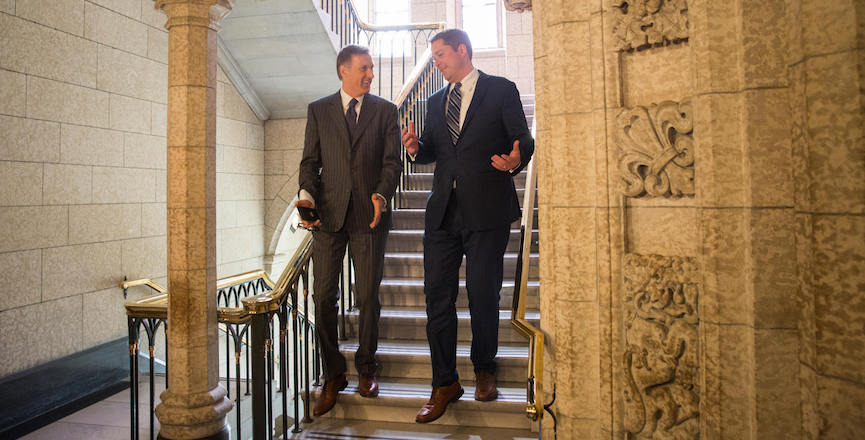On the first day of the Conservative policy convention in Halifax, Quebec MP Maxime Bernier, who nearly secured the Conservative Party of Canada’s leadership in last year’s race, resigned from the CPC and has committed to building an alternative conservative party, which he claims will be viable in time for the 2019 federal election.
Does the CPC-Bernier schism represent a conservative implosion? And if so, how does this bode for Canadian federal politics? Let’s rewind.
While a deepening rift between Bernier and CPC Leader Andrew Scheer has become apparent over the past year, fresh drama unfolded this week after Bernier issued a series of embittered, racist tweets criticizing Trudeau’s “extreme multiculturalism” and “cult of diversity” as conspiracies to consolidate government power, and calling immigrants and newcomers threats to “Canadian” (read: settler, white) identity.
Bernier’s racism runs deep. Just days earlier, writes Pamela Palmater, he unleashed a string of vitriolic tweets trashing the Liberal government’s plan to follow the TRC’s recommendations and designate a statutory holiday in commemoration of the structural violence inflicted on Indigenous communities by the residential school system. Bernier called the proposed holiday “another sick characteristic of extreme PC [political correctness] and multiculturalism.” (Read about the national commemorative holiday here.)
Scheer was hard-pressed to distance the CPC from Bernier’s tweets, prompting Bernier to go rogue and cut ties with the Party. Alone at his press conference, Bernier declared the CPC too “intellectually and morally corrupt to be reformed” and vowed his new party would shore up Canadian conservatives disillusioned with the CPC and the Liberals.
Bernier and other Canadian conservatives are emboldened by the embattled far-right in the U.S., who take to Twitter to lash out and claim corruption or conspiracy whenever cold, hard facts pose challenges. Of course, this anti-immigrant rage isn’t a new phenomenon, as Monia Mazigh details this week. Politicians raising the spectre of fear around newcomers today evoke the discrimination that immigrants have faced over the course of Canada’s history.
But as the federal election nears, we’re likely to see this trend pick up speed. “That’s the gloomy view,” writes David Climenhaga. “The upbeat interpretation is that Twitter is a terrible swift sword — perhaps devised by the Almighty to be deployed by Silicon Valley, or the other way ’round — on which North American movement conservatism can impale itself.”
We can speculate about the level of impact and support Bernier’s new party could wield, if consolidated in time for next year’s federal elections. We can imagine how a conservative rift could boost support for the Liberals — indeed, Bernier’s tweets prompted record-setting donations to the federal Liberals.
But what the Bernier saga drives home for us here at rabble is the absolute necessity of fierce progressive alternatives in the face of an increasingly racist, xenophobic popular discourse. Perhaps the conservative implosion is an opportunity for us rabble rousers to reaffirm our commitment to standing in solidarity with Indigenous peoples and re-articulate our unwavering support for immigrant communities across the globe.
In other rabble news
Calling all emerging Canadian writers! Do you wield words in service of progressive alternatives and social movements? Have a fresh perspective on media criticism, Indigenous activism, environmental policy? Want to develop your writing and journalism chops? Apply to become rabble’s second Jack Layton Journalism for Change Fellow. We’re training the next generation of fierce journalists. Learn more about the Fellowship and check out the full application guidelines here.
The latest installment in our Activist Toolkit’s “Constructing Change” series brings you the inside scoop on the growing movement around workers’ co-operatives in Canada. With inspiring stories coming out of Halifax from the Glitter Bean Café, a unionized co-op and safe space for LGBTQ youth in Halifax, rabble reached out to interview Hazel Corcoran, the Executive Director of the Canadian Workers Co-operative Federation (CWCF). Read the interview to learn more about how co-ops are building more equitable workplaces and generating community wealth.
Image: Andrew Scheer/Flickr
Like this article? rabble is reader-supported journalism. Chip in to keep stories like these coming.




